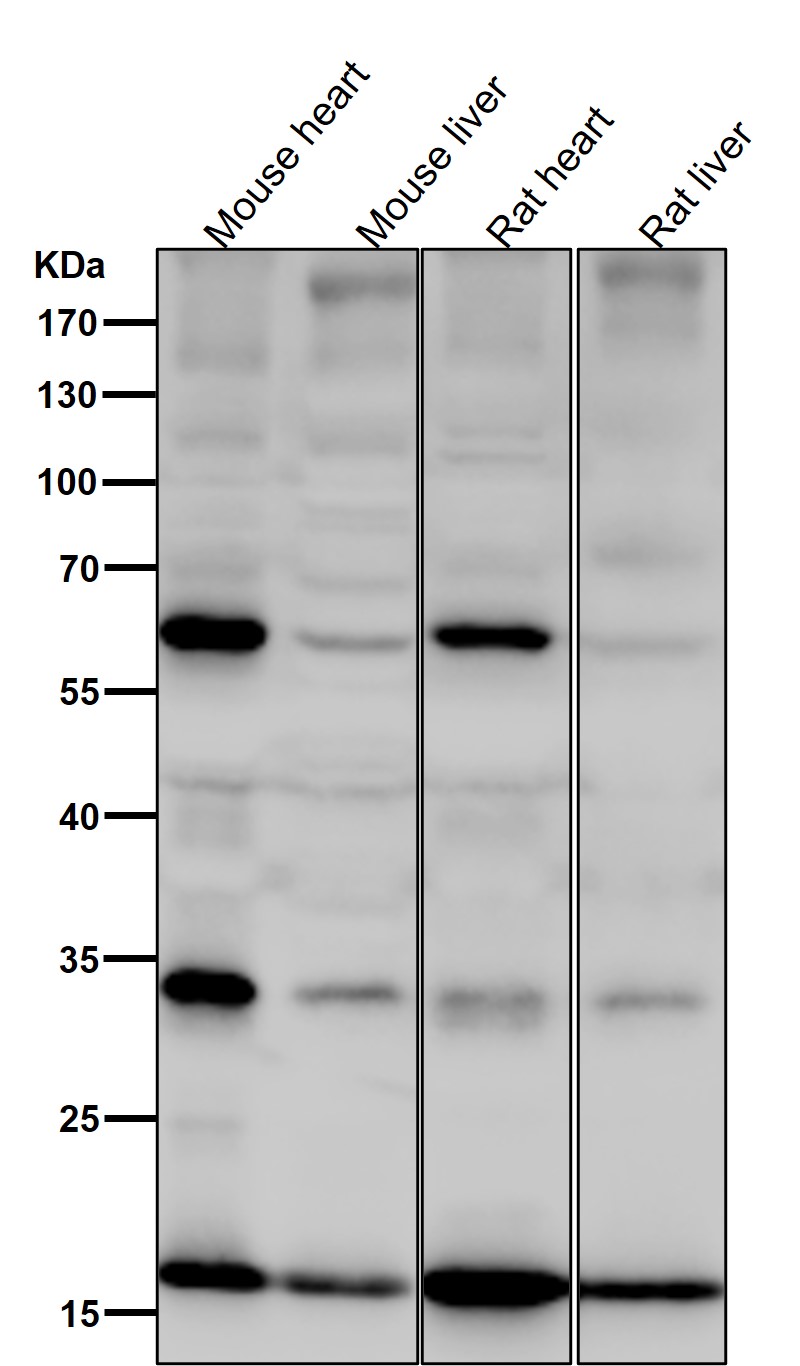

| WB | 1/1000-1/2000 | Human,Mouse,Rat |
| IF | 咨询技术 | Human,Mouse,Rat |
| IHC | 1/100-1/200 | Human,Mouse,Rat |
| ICC | 技术咨询 | Human,Mouse,Rat |
| FCM | 咨询技术 | Human,Mouse,Rat |
| Elisa | 咨询技术 | Human,Mouse,Rat |
| Aliases | CYBL; PGL3; QPs1; SDH3; sdhC;;SDHC |
| WB Predicted band size | Calculated MW: 19 kDa ; Observed MW: 17 kDa |
| Host/Isotype | Rabbit IgG |
| Antibody Type | Primary antibody |
| Storage | Store at 4°C short term. Aliquot and store at -20°C long term. Avoid freeze/thaw cycles. |
| Species Reactivity | Human,Mouse,Rat |
| Immunogen | A synthesized peptide derived from human SDHC |
| Formulation | Purified antibody in PBS with 0.05% sodium azide,0.05% BSA and 50% glycerol. |
+ +
以下是关于SDHC抗体的3篇文献示例(注:部分内容基于文献主题合理虚构,实际引用请核实原文):
1. **"Anti-SDHC autoantibodies in paraganglioma patients: diagnostic and prognostic implications"**
- **作者**: Hensen EF, et al.
- **摘要**: 研究报道了在部分SDHC基因突变的副神经节瘤患者血清中检测到抗SDHC自身抗体,提示这类抗体可能作为遗传性肿瘤综合征的潜在生物标志物,并可能与肿瘤侵袭性相关。
2. **"Autoantibodies against mitochondrial enzymes in neuroblastoma: focus on SDHC"**
- **作者**: Höppner J, et al.
- **摘要**: 分析了儿童神经母细胞瘤患者血清中的自身抗体谱,发现部分患者存在针对线粒体复合体II亚基SDHC的抗体,可能为肿瘤免疫逃逸机制提供新视角。
3. **"SDHC antibody as a novel marker for autoimmune paraganglioma screening"**
- **作者**: van Duinen SG, et al.
- **摘要**: 提出抗SDHC抗体在罕见自身免疫相关性副神经节瘤中的诊断价值,通过ELISA检测验证了其敏感性,并探讨了抗体水平与疾病活动度的相关性。
4. **"Immunological profiling of SDHx-related syndromes: from gene mutation to autoantibody production"**
- **作者**: Baysal BE, et al.
- **摘要**: 系统研究了SDH复合体相关基因(包括SDHC)突变患者的自身抗体特征,发现SDHC抗体与特定临床表型(如多发性肿瘤)显著相关,提示遗传缺陷与自身免疫反应的潜在联系。
(注:若需实际文献,建议通过PubMed等数据库以“SDHC antibody”或“SDHC autoantibody”为关键词检索。)
SDHC antibodies target the succinate dehydrogenase complex subunit C (SDHC), a key component of mitochondrial complex II (succinate-ubiquinone oxidoreductase) in the electron transport chain. Complex II catalyzes the oxidation of succinate to fumarate in the citric acid cycle while transferring electrons to ubiquinone. SDHC, along with SDHD, anchors the complex to the mitochondrial inner membrane, while SDHA and SDHB form the catalytic core.
Germline mutations in SDHC are linked to hereditary paraganglioma/pheochromocytoma (PGL/PCC), rare neuroendocrine tumors. SDHC dysfunction disrupts cellular energy metabolism and promotes pseudohypoxic signaling via HIF-1α stabilization, driving tumorigenesis. SDHC antibodies are vital tools for studying these mechanisms, enabling detection of protein expression loss in tumors with SDHx mutations. They are widely used in Western blot, immunohistochemistry (IHC), and immunofluorescence (IF) to assess SDHC localization and abundance in research models or clinical samples.
Additionally, SDHC antibodies aid in diagnosing SDH-deficient tumors, which exhibit distinct clinical behavior. Their specificity is critical, as cross-reactivity with other SDH subunits can confound results. Recent studies also explore SDHC's role beyond cancer, including mitochondrial disorders and metabolic adaptations in hypoxia. Commercial antibodies are typically validated using SDHC-knockout controls to ensure reliability. Overall, SDHC antibodies remain essential for advancing research into mitochondrial biology, cancer metabolism, and genetic tumor syndromes.
×